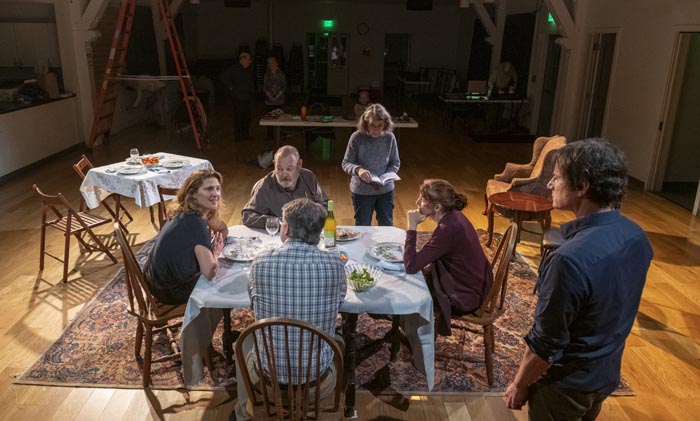
Persistence and devotion have kept Performing Arts of Woodstock going into its 60th year while many community theaters nationwide have been struggling to survive.
PAW was started in June 1964 by Edith LeFever and the late Eda Crist. LeFever, who is nearly 90, is still very much involved in PAW. She was its president for half a century.
“She’s withdrawn to some degree, but she’s still active and gives us good advice,” reported Adele Calcavecchio, who has been president for about five years. She first became involved in PAW in 1974 when she acted in a play called New Money
PAW “was founded back in the day, when the only available opportunity for actors in Woodstock was the Woodstock Playhouse, basically a summer-stock place which hired only traveling professional actors,” Calcavecchio said.
PAW’s first production was The Lesson by Eugene Ionesco, directed by LeFever.
“The mission has always been that we’re here to entertain and challenge and give an opportunity for thinking to people. We look for very-well-written work,” Calcavecchio said.
The new season, which opened October 27, features the Apple Family series of plays by Richard Nelson, starting with Sweet and Sad, directed by Ellen Honig. Audiences were introduced to the Apple Family characters last season with That Hopey Changey Thing, referring to Sarah Palin’s comment, “How’s that hopey changey thing going?”
“The audiences just loved seeing these people from Rhinebeck sitting around the dining-room table talking out issues, political and familial, and they’d love the idea of seeing more about these people,” Calcavecchio said. “That Hopey Changey Thing was set on the night of Barack Obama’s disastrous midterm election where he lost a lot of seats. And this one is set a year later, on the tenth anniversary of 9-11.”

In March, PAW presents God of Carnage, directed by Shelly Wyant.
Calcavecchio is especially excited about the June production, a director showcase featuring three one-act Thornton Wilder plays.
“One is called Queens of France, in which a shyster tries to convince various ladies in Louisiana — this is set in the late 1800s — that each of them is the queen of France,” she said. “Another one is called Such Things Happen Only in Books. And this is a guy who has writer’s block. And he’s completely surrounded with things that other people would write a play about, but he doesn’t see them.” Calcavecchio said that was because he’s a bit of a blockhead himself.
“And then an utterly hilarious play in which I did many performances is called Infancy,” she continued. “And it’s set in Central Park, about two little babies who were playing male babies who were played by full-grown men in baby carriages. And they talk to each other. The audience understands them, but the adults on stage don’t at all. And it’s rolling-down funny, actually.”
Calcavecchio said the plays were chosen by a reading committee.
“We try to do at least one classic play a year,” she said. “And we have a group of directors with whom we work, and that is not static. People often come and go, but sometimes we ask a director if there’s a particular play that he or she was really keen to do, and could we help.”
Calcavecchio said PAW has been able to carry on through persistence and devotion. “All of the people involved have been doing this kind of work either here or somewhere else for a very long time. And, and it’s in our blood,” she said.
Board member Bethany Goldpaugh-Brown has done costumes, singing and parts in many plays. Then there’s LeFever, who is still involved. “She founded it with, with almost the same level of enthusiasm and determination that we will do it. And we do,” Calcavecchio said. “We do important work, and we do it solidly. And often, we introduce new ideas to people. And we are as inclusive as we possibly can be.”
PAW relies on a stable of actors and holds auditions to fill in the gaps. With people’s busy lives, it has become tougher.
“It is really a challenge,” she conceded. “People when they are cast, or when they are hired to be directors have to be extremely flexible. We’ve had a lot of difficulty. It’s really been tough with different work schedules and different health schedules and cousins dying, uncles dying, mothers getting sick, whatever. It’s really been interesting, but we made it as always.”
Tech people and directors are paid. Actors get a small amount for their time and devotion.
“We are one of the very few groups in the area that that gives what I call gas money to our actors,” she said.
PAW is a nonprofit organization that receives donations and bequests.
“We never make money on a play,” Calcavecchio.said. “It costs us about $10,000 per production. It’s gone up a lot, partly because we pay the people but partly because of other expenses, too.”
PAW pays Woodstock town government $1500 per production in rent for rehearsal and performance space at the Mescal Hornbeck Community Center.
PAW pays about $125 per production for royalties. Then there are costume purchases and advertising costs.
Thanks to a grant from Ulster County, PAW has about 20 assistive hearing devices for those audience members who need them.
Sweet and Sad runs through November 12. Friday and Saturday shows are at 7:30, with Sunday matinees at 1:30. Tickets are available at performingartsofwoodstock.com.
